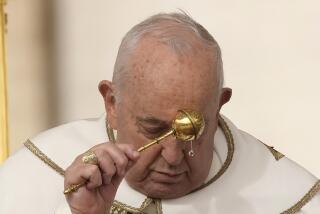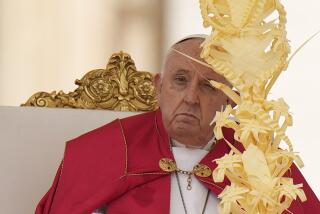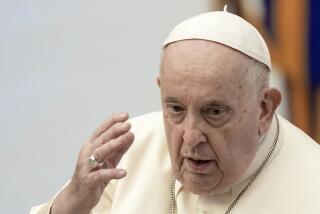Amid Bad News, Pope Celebrates the Joy of Easter
VATICAN CITY — Thunderheads riding a cold wind roared above St. Peter’s Square. Rain lashed worshipers and a flower-draped altar before the giant church, auguring perhaps a bittersweet Easter for an aging Pope.
Pilgrims and cardinals alike huddled under umbrellas against the storm Sunday as John Paul II celebrated the Resurrection of Christ at his annual outdoor Mass, a spring festival overtaken this year by winter’s return--and disappointing news for history’s most-traveled Pope.
A long-bruited visit to the Holy Land that John Paul has called his “greatest dream” will not be possible anytime soon, the ranking Roman Catholic Church official in Jerusalem cautioned Sunday.
And, The Times has learned, Vatican officials are preparing to cancel a long-planned papal visit to Lebanon in June because of security concerns.
Sunday’s storm did not diminish either the number of Easter pilgrims excitedly filling the cobblestoned piazza before the basilica or their enthusiasm for the white-haired leader of the world’s 900 million Catholics.
John Paul, 74 next month and increasingly stooped, greeted the sodden multitude clear-eyed and strong-voiced in a magnificent white robe trimmed in red.
“May love triumph over hate! The peoples enervated by material and moral poverty thirst for security and peace. When will people finally be able to live as brothers and sisters in harmony with one another?” John Paul demanded from the balcony of St. Peter’s in his annual Urbi et Orbi message (To the City and the World).
History’s first Polish Pope, who began his extraordinary reign in 1978, preached a message of peace and understanding. He urged support for the family and for communities around the world united by shared moral values.
“Humanity needs Christ: He is the source of peace, of the life that knows no death,” John Paul said. “May this joyful announcement resound especially in Jerusalem, as it did the first time.
“May it resound in the Balkans, in the Caucasus, in Africa and in Asia and in all the nations where the din of weapons still continues, where nationalism arouses dangerous forms of evil extremism, where races and social classes endlessly oppose one another.
“May this proclamation of peace inspire all those in the wealthy societies who are trying to give a meaning to life and to organize civil society on the foundation of values more in keeping with the dignity of man and his transcendent vocation,” John Paul prayed.
Jerusalem, site of Christ’s Crucifixion, is the city that the Pope would most like to visit. It would be the culmination of his papacy, he has often said.
John Paul personally directed two years of quiet diplomacy that led to an agreement Dec. 30 between the Vatican and Israel to open full diplomatic relations. Since then, Vatican diplomats have worked behind the scenes to encourage progress in peace talks between Israelis and Palestinians. John Paul defends both the rights of Palestinians for a homeland and that of Jews for their own state.
“It must be understood that Jews, who for 2,000 years were dispersed among the nations of the world, had decided to return to the land of their ancestors. This is their right,” John Paul told correspondent Tad Szulc in an unprecedented interview published in Parade magazine Sunday.
Despite the fresh Israeli-Palestinian understandings, it is premature for a papal pilgrimage to the Holy Land because “there was no progress in people’s hearts,” Michael Sabbah, Roman Catholic patriarch of Jerusalem, said in an interview Sunday with Italian national radio.
“When the Christians of Bethlehem can reach Jerusalem without the permission of a military governor, when they and all the other inhabitants of the occupied territories are free and not subject to such severe security measures--then we can think about a papal visit,” said Sabbah, a Palestinian.
Seeking an evenhanded role in the volatile Middle East, John Paul also seeks to protect Christian communities in Arab countries. Largest among them is Lebanon, a repeated focus of public papal prayers during its civil war.
At papal insistence, Vatican planners had cobbled together a visit there for the first days of June. Now, however, Vatican sources say the trip will be scrapped.
A bomb that killed 10 worshipers and wounded 60 more at Our Lady of Salvation Church just north of Beirut in February short-circuited the visit, they say.
The concern is less for papal safety than that public events marking his presence might invite a terrorist attack, the sources say. Citing rising ethnic tensions, Lebanese bishops who invited the Pope now believe that it is wiser if he does not come, The Times has learned.
Among the tens of thousands massed before St. Peter’s on Sunday to see John Paul were peace marchers led by the mayors of 86 European cities.
Continuing an Easter tradition as part of a message broadcast around the world, John Paul offered greetings in 57 languages, including English, Hebrew, Arabic, Tamil, Urdu, Chinese, Vietnamese, Czech, Croatian, Greek, Albanian, Slovene, Estonian and Esperanto.
More to Read
Sign up for Essential California
The most important California stories and recommendations in your inbox every morning.
You may occasionally receive promotional content from the Los Angeles Times.










